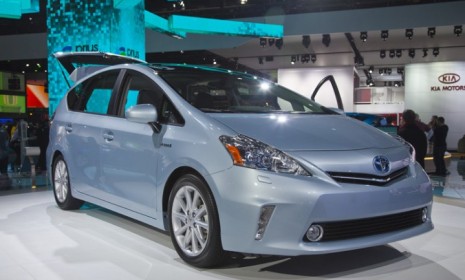Is that 'new car smell' toxic to your body?
An annual study of over 200 vehicles ranks models based on the number of harmful chemicals inside. And the worst car interior goes to...

A free daily email with the biggest news stories of the day – and the best features from TheWeek.com
You are now subscribed
Your newsletter sign-up was successful
Taking a deep breath in that new sports car might not be such a good idea. The new car smell many drivers love actually comes from the off-gassing of chemicals in your car's interior. And some of the compounds might be toxic. A Michigan environmental watchdog, the Ecology Center, has just released the results of its annual test of chemical levels in the interiors of 200 vehicles. Here's what you should know:
Where does the smell come from?
That fresh "new car smell" comes from "chemicals emitted from things like the steering wheel, dashboard, and seats," says Jennifer Geiger at the Chicago Tribune. The Ecology Center says that long-term exposure to these chemicals can be hazardous to your health. And after their homes and offices, Americans spend more time — 1.5 hours — in their cars every day than anywhere else.
The Week
Escape your echo chamber. Get the facts behind the news, plus analysis from multiple perspectives.

Sign up for The Week's Free Newsletters
From our morning news briefing to a weekly Good News Newsletter, get the best of The Week delivered directly to your inbox.
From our morning news briefing to a weekly Good News Newsletter, get the best of The Week delivered directly to your inbox.
What kind of chemicals are they?
The Ecology Center identified more than 275 chemicals, some of which are associated with allergies, birth defects, impaired learning, liver problems, and cancer. They included chromium and lead, as well as volatile organic compounds that come from brominated flame retardants and other additives in some cars' plastic parts. High temperatures can make the concentrations worse. "Vehicle interiors contain a unique cocktail of hundreds of toxic chemicals," says Ecology Center research director Jeff Gearhart. "Automobiles function as chemical reactors, creating one of the most hazardous environments we spend time in."
Are they really that dangerous?
Not all agree. The Vinyl Institute, a trade association representing plastic manufacturers, opposed the report, saying that PVC (polyvinyl chloride) is widely and acceptably used in a number of consumer products. "The Ecology Center likes to issue scary reports about materials in cars and homes," representative Adam Blakely tells USA Today, "but in fact they have no data showing actual injuries, and, in fact, no data showing exposures that would suggest harm."
A free daily email with the biggest news stories of the day – and the best features from TheWeek.com
Which cars are considered the most dangerous?
The non-profit tested 200 car models from 2011 and 2012 and ranked them from least toxic to most toxic. The safest vehicles with the lowest levels of potentially harmful chemicals were the 2012 Honda Civic, the 2011 Toyota Prius, and the 2011 Honda CR-Z. As for the most dangerous, the 2011 Mitsubishi Outlander Sport tied with the 2011 Chrysler 200 SC, with the 2011 Kia Soul and 2011 Nissan Versa close behind.
Sources: Chicago Tribune, HealthyStuff.org, USA Today, Web MD, ZDNet
-
 What is the endgame in the DHS shutdown?
What is the endgame in the DHS shutdown?Today’s Big Question Democrats want to rein in ICE’s immigration crackdown
-
 ‘Poor time management isn’t just an inconvenience’
‘Poor time management isn’t just an inconvenience’Instant Opinion Opinion, comment and editorials of the day
-
 Bad Bunny’s Super Bowl: A win for unity
Bad Bunny’s Super Bowl: A win for unityFeature The global superstar's halftime show was a celebration for everyone to enjoy